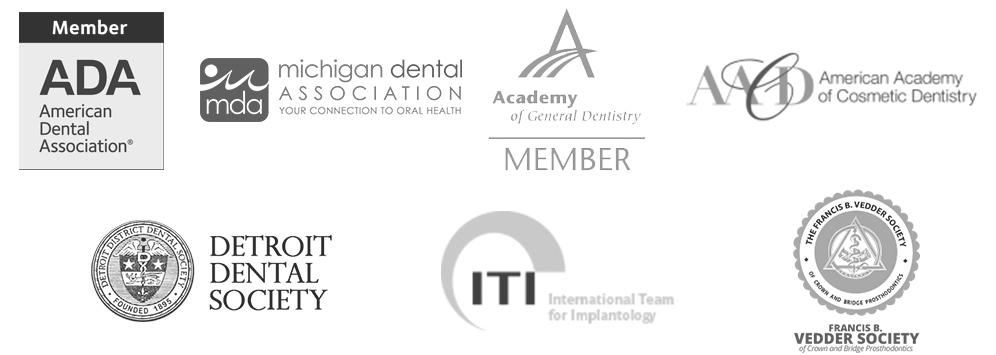Oral Appliances for Restful Nights
From transforming your sleep quality to relieving jaw pain and enhancing your overall oral health, oral appliances offer a gateway to a brighter and more comfortable future. Our Farmington Hills, MI dentist, Dr. Roman Shlafer can assist you in stepping into the realm of oral appliances and unlocking the potential for a revitalized and confident you.
What Are Oral Appliances?
Oral appliances are specialized devices that are worn during sleep to treat and manage obstructive sleep apnea (OSA). OSA occurs when the airway becomes partially or completely blocked, leading to pauses in breathing throughout the night. These appliances work by repositioning the jaw and tongue to keep the airway open, allowing for uninterrupted airflow and a restful night’s sleep.
Benefits of Oral Appliances
Using oral appliances for sleep apnea offers several benefits, including:
- Improved Sleep Quality: By keeping the airway open, oral appliances help reduce or eliminate snoring and episodes of interrupted breathing, leading to improved sleep quality.
- Enhanced Daytime Alertness: With better sleep quality, individuals using oral appliances often experience increased daytime alertness and reduced daytime fatigue.
- Non-Invasive Treatment: Oral appliances provide a non-invasive alternative to continuous positive airway pressure (CPAP) therapy, which involves wearing a mask over the nose and/or mouth.
- Portability and Convenience: Oral appliances are compact, portable, and easy to use, making them a convenient choice for individuals who travel frequently.
- Improved Overall Health: Treating sleep apnea can have a positive impact on overall health, reducing the risk of cardiovascular problems, hypertension, and other associated health issues.
Candidacy for Oral Appliances
Candidates for oral appliances for sleep apnea include:
- Individuals with mild to moderate obstructive sleep apnea.
- Those who are unable to tolerate or prefer not to use continuous positive airway pressure (CPAP) therapy.
- Individuals who have undergone a thorough evaluation by a sleep specialist or dentist.
- People with a confirmed diagnosis of obstructive sleep apnea through sleep studies.
- Those without severe dental or oral health issues that may hinder the use of an oral appliance.
- Individuals who have realistic expectations and are committed to using the oral appliance consistently as prescribed.
- Patients who have received professional guidance and recommendation from a qualified dental sleep medicine practitioner or sleep specialist.
How Does the Procedure Work?
The process of obtaining an oral appliance for sleep apnea generally involves the following steps:
- Consultation and Evaluation: The first step is to consult with your Farmington Hills dentist who is experienced in dental sleep medicine. He will evaluate your symptoms, medical history, and perform a sleep study if necessary.
- Customization: If an oral appliance is deemed suitable, the next step involves customizing the appliance to your specific oral anatomy. This process may involve taking impressions of your teeth and jaws or using advanced digital scanning technology.
- Fitting and Adjustments: Once the appliance is fabricated, you will have a fitting appointment with Dr. Shlafer. He will ensure that the appliance fits properly and make any necessary adjustments to ensure comfort and effectiveness.
- Follow-Up and Monitoring: Regular follow-up appointments are scheduled to monitor the progress, assess any changes, and make adjustments as needed. These appointments also provide an opportunity to address any concerns or questions you may have
Frequently Asked Questions
While oral appliances can effectively treat sleep apnea, they may not cure the condition entirely. However, they can significantly reduce the symptoms and improve sleep quality. Oral appliances work by keeping the airway open during sleep, preventing obstruction and allowing for uninterrupted breathing.
In many cases, oral appliances can significantly reduce or eliminate snoring. Snoring often occurs due to the partial obstruction of the airway during sleep. Oral appliances for sleep apnea work by repositioning the jaw and tongue to keep the airway open, allowing for improved airflow. By maintaining proper airway patency, oral appliances can help reduce snoring episodes.
Oral appliances are custom-made to fit comfortably in your mouth. While it may take some time to adjust to wearing them, most individuals find them relatively comfortable, especially when compared to other treatment options.
Yes, oral appliances can be used for children in certain cases. However, it is essential to consult with a pediatric dentist or orthodontist to determine the appropriateness of an oral appliance for a child and to ensure proper treatment planning and monitoring.



